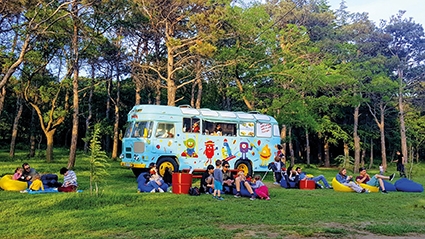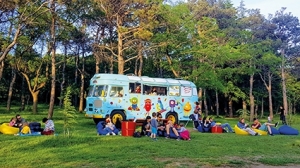Next Step for Tbilisi Night Economy: Food Trucks
Last spring, Tbilisi City Hall introduced the Night Economy concept, which aims to reinvigorate Tbilisi’s after-hours cultural and social life through policies that encourage safe and regulated night activities. The concept involves restaurants, bars and nightclubs that are most active from 6 pm to 6 am. Leading the project’s implementation from City Hall is Sergi Gvarjaladze, a former journalist, producer, and TV presenter.
The new “Mayor of the Night” has already proposed several initiatives within Tbilisi Night Economy, including the possibility of issuing permits for street performers and developing a special night bus route (number 22).
The aim of Night Economy is to improve relationships between several sectors of the economy and the city, to capitalize on tourism opportunities and to welcome those interested in nightlife to the capital. “The main goal of our project is to create new jobs and support the development of small and medium businesses, especially in the tourism and restaurant sectors. We want to position Tbilisi as a 24/7 city and organize cultural and sports events for a wider group of people,” Gvarjaladze told GEORGIA TODAY last April.
Now, a new project is being introduced under the Night Economy umbrella – food trucks. Tbilisi Deputy mayor Sophio Khuntsaria announced the plan late last week, saying that specific locations would be allocated for food trucks to operate in Tbilisi. She noted that small businesses have already expressed their support for and interest in the project.
Khuntsaria explained that a survey will be conducted in each of the city’s ten districts to examine the potential demand for different aspects of Night Economy and to determine what direction the concept’s development should take in different parts of the city.
“Development of the night economy is not just for tourism or for people who are oriented on entertainment – the local population should [also] benefit from working at night,” said Khuntsaria.
In his April interview, Gvarjaladze emphasized that the Night Economy concept would be inclusive of the whole city, not just the central districts, and would in fact help revitalize suburban areas. “Gldani, Varketili, and some other big ‘sleeping’ areas of the city lack cultural life. We aim to change that and to bring new life into these districts. People should have the chance to participate in an active life throughout the city. Another priority is to reuse old, abandoned Soviet-style buildings. Often, they were used for industrial purposes in the past and have since lost their purpose,” said Gvarjaladze.
Food trucks could help fill a market of late-night eating that is mainly dominated now by shawarma stands of varying quality, and often have questionable health and safety standards. They also may encourage more creativity in the Georgian food scene, providing a space for people to play with traditional cuisine and themes and introduce more variety – which would benefit tourists alongside local consumers and entrepreneurs. The current food truck scene in Georgia is primarily limited to trucks or stands that appear for special events, such as on the pedestrian section of Aghmashenebeli St. or on Rustaveli during holidays when the street is closed to traffic. In many cities around the world, food trucks are an integral part of the culinary environment, offering a quick and easy lunch to hungry workers and serving as a perfect way to soak up alcohol after a night out. If the new project is successful, Tbilisi’s residents and visitors can look forward to the flourishing of a new cultural element that could benefit a large section of society.
By Samantha Guthrie
Image source: Pazzy Food Truck, Facebook











